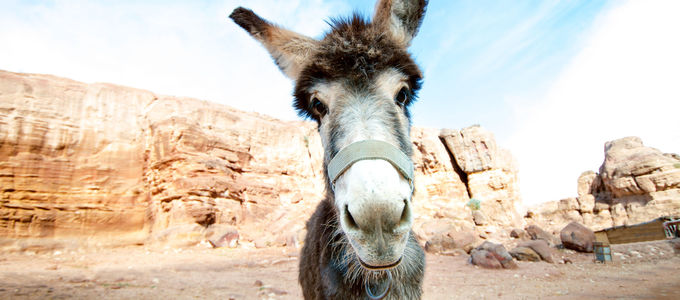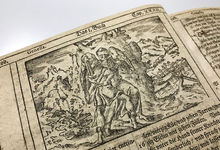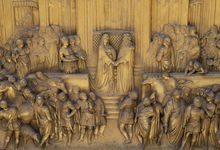Blessing instead of curse: a seer blinded
The first real prophet in the Bible? Well, actually a seer and fortune-teller. But this seer was blind to the will of God, in fact, so blind that God made an animal speak to open his eyes. This is the story about Balaam’s talking donkey.

What archaeologists recovered during an excavation in Deir ’Alla in Jordan in March 1960 was quite a sensation. It took them seven years to reconstruct the roughly 150 pieces of wall plaster and publish the resulting inscription: “Lo! Gods came to him in the night … And Balaam rose in the morning … and wept aloud,” reads one translation of the reconstructed inscription, which has been dated to 880–770 BCE.
Balaam? Doesn’t that name ring a bell? Indeed, Balaam is one of the few persons in the Bible whose existence is confirmed by independent historical sources. Balaam appears out of nowhere in chapters 22 to 24 of the book of Numbers. In fact, his appearance is so sudden that some Rabbis of the Talmudic tradition considered ranking this as a separate book of Moses entirely.
A piece of finest literature
The story is set at the close of the Israelites’ journey through the wilderness while they are in the plains of Moab, shortly before their invasion of the Promised Land. Balak, king of Moab, is alarmed and afraid of the battle-hardened and victorious people, and sends for Balaam to come and curse the Israelites—for a fee, of course. However, a prophet can only speak what God commands him to say, and so it is that Balaam speaks words of blessing instead.
The two chapters are elaborately structured. Twice, Balaam starts out on his long journey, and three times his journey is interrupted. Three times he tries to put a curse on the people. Instead, he blesses them four times. While the blessings are markedly poetic, the narrative employs all sorts of dramatic effects and tricks: the way becomes narrower and narrower, and the king becomes more and more desperate.
Stars foreshadowed
Two passages leave a lasting impression. The last blessing that Balaam pronounces culminates in the prophecy: “A Star shall come out of Jacob,” (Numbers 24: 17). The prophecy is fulfilled in the New Testament, namely in Jesus Christ. This is reflected in the story of Jesus’ birth and the events surrounding the star of Bethlehem. The magi, who had travelled a long way from the East, went back after their visit and practised a kind of metaphysics that the Israelites considered rather suspect—just like the fortune-teller Balaam.
And then there is still the matter of the donkey. As Balaam was riding on his donkey, the animal balked at an angel standing in its way. But Balaam, who could not see the angel, beat the animal to get it back on the road. God finally opened the donkey’s mouth and, in the process, the prophet’s eyes.
What does Balaam teach us?
A talking animal? How ridiculous! Isn’t that just a fable? Even Jewish scholars and Christian Church fathers already had their issues with this passage. Nevertheless, many of them presumed it was merely part of day-to-day life for the people of the day to understand what their animals were trying to tell them.
Ultimately, it is not important whether the donkey actually spoke or whether Balaam merely understood what his donkey wanted to tell him. The truly important thing is the lesson we can learn from this story. Many interpretations are possible. Three examples are listed.
- If you meet with resistance in what you are doing, make the effort to take a closer look. Maybe it is an angel of the Lord trying to prevent you from continuing. Listen to him. Perhaps your wishes are in opposition to the will of God.
- If you ever happen to be standing at the altar feeling like a “donkey”—or perhaps find yourself sitting in the pew with critical thoughts about the service—remember that it is God who opens the mouth of His servants to speak.
- And last but not least, take comfort in the knowledge that the efforts of any who seek to curse you will ultimately come to naught. In the end they will only succeed at one thing, namely in bringing you blessing.
Photo: tibor13 / Fotolia
Article info
Author:
Date:
Keywords:
Andreas Rother
24.04.2018
Bible Study
, Divine service,
Doctrinal instruction




















